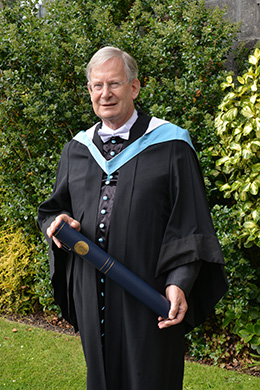Laureation address – Sir John Eliot Gardiner
Sir John Eliot Gardiner
Laureation Address
Laureator: Dr Michael Downes
Thursday 26 June 2014
 Chancellor, it is my privilege to present Sir John Eliot Gardiner for the degree of Doctor of Music, honoris causa.
Chancellor, it is my privilege to present Sir John Eliot Gardiner for the degree of Doctor of Music, honoris causa.
It would be easy to justify Sir John Eliot’s nomination simply by listing some of his achievements. He regularly conducts the world’s finest orchestras, including the London Symphony, the Vienna Philharmonic and Amsterdam’s Royal Concertgebouw. He has founded and continues to direct three groups – the Monteverdi Choir, the English Baroque Soloists and the Orchestre Révolutionnaire et Romantique – whose excellence is acknowledged worldwide. He has made more than 250 highly acclaimed recordings, for which he has won more Gramophone awards than any other living artist.
However, such a citation, impressive though it would be, would not capture what has made Sir John Eliot’s contribution to musical life so distinctive. He has never been content simply to work within existing institutional structures and repertory preferences; rather, his passion for founding new ensembles and reinterpreting composers who are unknown or in some way misunderstood has ensured that his listeners’ experience of music is radically changed. He is a leading practitioner of ‘historically informed performance’, advocating that performers should use every resource at their disposal to ensure that their sound and style of performance are as close as possible to what the composer would have heard, rather than applying a generalised ‘modern style’ to earlier music regardless of its specific origins. If this idea now seems uncontroversial, even commonplace, particularly in Britain, then this is in no small part due to the pioneering work of Sir John Eliot.
The English Baroque Soloists, which Sir John Eliot founded in the 1970s, were one of the first groups in Britain to play on instruments built and set up as they would have been in the period in which the music was written; only in that way, he argued, could performers achieve the articulation, phrasing, timbres and orchestral balance that would bring music to life in the way the composer wished. This approach has transformed our appreciation not only of baroque music, but also, in the last couple of decades, of music of the more recent past. Again, Sir John Eliot has been at the forefront of this development: his work with the Orchestre Révolutionnaire et Romantique, which he founded in 1989, has shown that a historically informed approach to choices about tempo, technique and style can also yield spectacular results in nineteenth and early twentieth century music. The ORR has transformed our understanding of Berlioz, and has brought a new appreciation of composers as familiar as Brahms and Schumann, by presenting their orchestral music with a transparency and vitality sometimes lacking in more conventional orchestras. But Sir John Eliot has also taken the discoveries that he has made with these specialist ensembles back into his work with established orchestras, producing revelatory results with composers as diverse as Rachmaninov and Britten, Kurt Weill and Percy Grainger, as well as the earlier repertoire with which he is most immediately associated.
The knowledge on which Sir John Eliot draws to inform his performances goes well beyond the musical: he has a deep understanding of the historical and cultural forces shaping composers’ decisions, and of the relationship between music and the buildings for which it was written. He drew on this breadth of knowledge, as well as on his formidable entrepreneurial and logistical skills, in one of the most ambitious musical projects ever mounted: his ‘Bach Pilgrimage’ of 2000, during which he, the Monteverdi Choir and the English Baroque Soloists performed each of Bach’s 198 sacred cantatas in one of the great churches of Europe on its proper day in the liturgical calendar. This was an appropriate tribute to a composer who, in the words of Sir John Eliot’s recent book, ‘gives us the voice of God – in human form … showing us how to overcome our imperfections through the perfections of his music’. It was a project of which few other musicians could even have conceived, and which arguably no other could successfully have realised.
Chancellor, in recognition of his major contribution to the art, scholarship and public appreciation of music, I invite you to confer on Sir John Eliot Gardiner the degree of Doctor of Music, honoris causa.
Category Awards